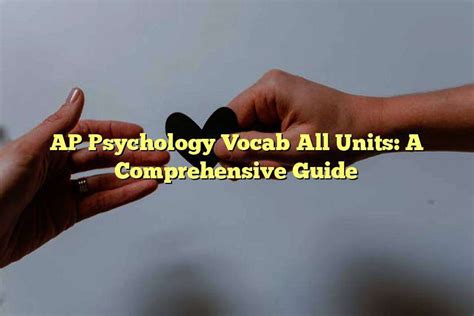Introduction

AP Psychology is a challenging yet rewarding course that delves into the fascinating world of human behavior. To succeed in this course, you will need to master a comprehensive vocabulary that encompasses various psychological concepts and theories.
Key Terms
1. Behavior
- Definition: Any observable action or response of an organism in its environment.
- Examples: Speaking, smiling, walking, jumping
2. Cognition
- Definition: The mental processes involved in acquiring, storing, and using knowledge, including perception, thinking, and remembering.
- Examples: Problem-solving, decision-making, memory retrieval
3. Emotion
- Definition: A temporary state of arousal characterized by physiological, behavioral, and subjective components.
- Examples: Joy, sadness, anger, fear
4. Motivation
- Definition: The internal drives that initiate, direct, and sustain behavior.
- Examples: Hunger, thirst, sexual desire, achievement
5. Personality
- Definition: A relatively stable pattern of thoughts, feelings, and behaviors that characterize an individual.
- Examples: Introversion, extroversion, agreeableness, conscientiousness
6. Research Methods
- Definition: Techniques used to collect and analyze data in psychology research.
- Examples: Surveys, experiments, case studies, interviews
7. Statistical Analysis
- Definition: The process of using statistical methods to analyze data and draw conclusions from them.
- Examples: Hypothesis testing, correlation analysis, regression analysis
8. Psychological Disorders
- Definition: Patterns of behavior that are maladaptive, causing significant distress or impairment in functioning.
- Examples: Anxiety disorders, mood disorders, personality disorders
9. Psychotherapy
- Definition: The treatment of psychological disorders using verbal and non-verbal techniques.
- Examples: Cognitive-behavioral therapy, psychodynamic therapy, humanistic therapy
10. Social Psychology
- Definition: The study of how individuals think, feel, and behave in social situations.
- Examples: Conformity, prejudice, aggression
Table 1: Key Cognitive Processes
| Process | Definition |
|---|---|
| Perception | Acquiring information through our senses |
| Attention | Focusing on specific stimuli |
| Memory | Encoding, storing, and retrieving information |
| Thinking | Manipulating information to solve problems |
| Language | Using symbols to communicate |
Table 2: Types of Motivation
| Type | Definition |
|---|---|
| Biological | Instinctive drives for survival and reproduction |
| Psychological | Drives based on learned needs and desires |
| Extrinsic | Motivation based on external rewards or punishments |
| Intrinsic | Motivation based on internal enjoyment or satisfaction |
Table 3: Common Psychological Disorders
| Disorder | Symptoms |
|---|---|
| Anxiety disorder | Excessive fear, worry, or avoidance |
| Mood disorder | Persistent feelings of sadness, hopelessness, or mania |
| Personality disorder | Maladaptive personality traits that impair functioning |
| Schizophrenia | Disorganized thoughts, hallucinations, delusions |
Table 4: Types of Psychotherapy
| Therapy | Techniques |
|---|---|
| Cognitive-behavioral therapy | Changing unhelpful thoughts and behaviors |
| Psychodynamic therapy | Exploring unconscious conflicts and motivations |
| Humanistic therapy | Focusing on personal growth and self-actualization |
| Behavioral therapy | Using rewards and punishments to modify behavior |
Tips and Tricks for Vocabulary Mastery
- Review regularly: Go over your vocab terms multiple times to improve retention.
- Use flashcards: Create flashcards with definitions and examples.
- Engage in active learning: Explain terms to yourself, write sample sentences, or create visual representations.
- Use context clues: Look for keywords and context in your readings to help you understand terms.
- Seek help: Ask your teacher, classmates, or a tutor if you encounter any difficulties.
Conclusion
Mastering the vocabulary of AP Psychology is crucial for success in the course. By systematically reviewing and actively engaging with these terms, you will develop a solid foundation for understanding the complexities of human behavior. Remember, the key to vocabulary mastery lies in consistent effort, active learning, and a commitment to comprehension.
